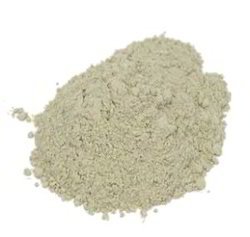Zeolite Zeoclin
Clinoptilolite
Grade: <40 microns
Uses: turf care, fertiliser manufacture, land remediation, swimming pool filter and waste water treatment
ZeoClin is a high quality natural zeolite (clinoptilolite).
PLEASE NOTE: This product is not for human or animal consumption.
Technical Background
Zeolites are a family of crystalline aluminosilicate minerals. In common with other zeolites, ZeoClin (clinoptilolite) has a three dimensional cage-like structure consisting of SiO4 and AlO4 tetrahedra joined by shared oxygen atoms. The negative charges of the AlO4 units are balanced by the presence of exchangeable cations which can be readily displaced by other substances, particularly ammonium and metal ions. This is known as cation exchange, and it is the high cation exchange capacity (“CEC”) of clinoptilolite which provides many of its useful properties.
Turf Care
ZeoClin, applied either by top dressing or “drill and fill” techniques, confers the following benefits:
- Improves nutrient and fertiliser retention in the root zone
- Granules absorb soluble nitrogen and potassium, reducing leaching of key nutrients
- Porous granules increase aeration resulting in healthier turf
- Improves germination rates
- Helps protect against fertiliser scorch
- Robust granules resist soil compaction
In addition, the use of ZeoClin as a perch layer on top of course backfill when installing drainage systems will minimise the loss of nutrients to ground water, helping to reduce nitrogen pollution and eutrophication.
Agriculture
In agriculture, clinoptilolite (a naturally occurring zeolite) is used as a soil treatment. It provides a source of slowly released potassium. If previously loaded with ammonium, the zeolite can serve a similar function in the slow release of nitrogen. Zeolites can also act as water moderators, in which they will absorb up to 55% of their weight in water and slowly release it under the plant's demand. This property can prevent root rot and moderate drought cycles.(source:wikipedia)
Manufacture of Slow Release Fertilisers
ZeoClin is used in the manufacture of slow release fertilizers, helping to prevent the leaching of excess nutrients into watercourses, thus reducing problems such as nitrogen pollution and eutrophication, as well as reducing the quantity of fertiliser required.
Land Remediation
The remediation of contaminated land is an increasingly important issue in many regions of the world. Traditional methods of remediation have included soil washing and soil removal, which are both expensive and disruptive to the environment. An alternative approach is to create soil conditions which immobilise contaminants whilst providing the nutrients and water holding capacity necessary for plant growth. Due to its ability to adsorb a suite of heavy metal contaminants, ZeoClin is already playing an important role in this new technology.
In swimming pools Zeolite acts as an excellent filter removing ammonia and particulates. ZeoClin is used to remove ammonia from effluents. It also has good selectivity for a number of heavy metal ions.
Pet stores market zeolites for use as filter additives in aquariums. In aquaria, zeolites can be used to adsorb ammonia and other nitrogenous compounds. However, due to the high affinity of some zeolites for calcium, they may be less effective in hard water and may deplete calcium. Zeolite filtration is used in some marine aquaria to keep nutrient concentrations low for the benefit of corals adapted to nutrient-depleted waters. (source:wikipedia)
Biogas Production by the Anaerobic Digestion of Organic Substrates
The production of Biogas, via the anaerobic digestion of organic substrates such as food waste and manure, is an increasingly important source of renewable energy. Biogas is a mixture consisting primarily of methane and carbon dioxide; the methane fraction is purified for use as a fuel. The decomposition of proteins produces ammonium ions which strongly inhibit the methanogenic bacteria in anaerobic digestion (AD) plants. The addition of Zeolite significantly enhances methane production by absorbing ammonium ions. Zeolite has also been shown to significantly reduce the accumulation of Volatile Fatty Acids (VFAs). This is important because elevated levels of VFAs result in a reduced pH and toxic conditions in the reactor. Zeolite also readily absorbs hydrogen sulphide and heavy metals, again positively influencing reactor productivity.
